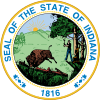A special election was held for the Indiana's 1st district after William Prince (DR-Jackson) died on September 8, 1824.
Contents
Consequently, a special election was held to fill the vacancy.
| Elections in Indiana |
|---|
 |
A special election was held for the Indiana's 1st district after William Prince (DR-Jackson) died on September 8, 1824.
Consequently, a special election was held to fill the vacancy.
| Candidate | Party | Votes [1] | Percent |
|---|---|---|---|
| Jacob Call | Jacksonian | 2,155 | 50.4% |
| Thomas H. Blake | Anti-Jacksonian | 2,087 | 48.8% |
| Ratliff Boon [2] | Jacksonian | 36 | 0.8% |
Call took his seat on December 23, 1824, [3] serving until the end of the 18th Congress on March 13, 1825.
The 1838–39 United States House of Representatives elections were held on various dates in various states between July 2, 1838, and November 5, 1839. Each state set its own date for its elections to the House of Representatives before the first session of the 26th United States Congress convened on December 2, 1839. They occurred during President Martin Van Buren's term. Elections were held for all 242 seats, representing 26 states.

Elections for the Pennsylvania State Senate were held on November 5, 2002, with even-numbered districts being contested. State Senators are elected for four-year terms, with half of the Senate seats up for a vote every two years. The term of office for those elected in 2002 ran from January 3, 2003 until November 28, 2006. Necessary primary elections were held on May 21, 2002.

The 1824–25 United States Senate Elections were held on various dates in various states. As these U.S. Senate elections were prior to the ratification of the Seventeenth Amendment in 1913, senators were chosen by state legislatures. Senators were elected over a wide range of time throughout 1824 and 1825, and a seat may have been filled months late or remained vacant due to legislative deadlock. In these elections, terms were up for the senators in Class 3.
On October 15, 1824, Charles Rich of Vermont's at-large district died in office. A special election was held for his replacement.

A special election was held in Delaware's at-large congressional district on October 1, 1822 to fill a vacancy left by the resignation of Caesar A. Rodney (DR) on January 24, 1822, having been elected to the Senate. This election was held on the same day as the general elections for Congress in Delaware.

A special election was held in New York's 15th congressional district to fill a vacancy left by the death of Representative-elect William Dowse (F) on February 18, 1813, before the beginning of the 13th Congress. The election was held April 27–29, 1813.

On August 2, 1813, at the end of the 1st session of the 13th Congress, Egbert Benson (F) of New York's 2nd district resigned. A special election was held for his replacement December 28–30, 1813

On October 8, 1816, a special election was held in Pennsylvania's 9th district, the second special election in that district in the 14th Congress. The reason for the special election was Thomas Burnside (DR)'s resignation to accept a judicial appointment in April of that year. Burnside himself had been elected to the seat in the previous special election.

On June 4, 1816, after being defeated for re-election, Enos T. Throop (DR) of New York's 20th district resigned his seat. A special election was held in September of that year to fill the vacancy left for the remainder of the 14th Congress

On December 15, 1815, having been elected to the Senate, Nathaniel Macon (DR) of North Carolina's 6th district resigned. To fill the vacancy left in North Carolina's representation for the 14th Congress, a special election was held on January 22, 1816.

On April 16, 1816, Richard Stanford (DR) of North Carolina's 8th district died in office. A special election was held to fill the resulting vacancy

On September 16, 1816, Representative-elect Henry B. Lee (DR) of New York's 4th district died before the start of the 15th Congress, to which he'd been elected. A special election was held prior to the beginning of the first session of Congress to fill the resulting vacancy.

On October 13, 1821, before the first meeting of the 17th Congress, Wingfield Bullock (DR) of Kentucky's 8th district died. A special election was held to fill the resulting vacancy.

On December 20, 1820, Jesse Slocumb (DR) of North Carolina's 4th district died. A special election was held to fill the resulting vacancy

On September 7, 1821, Representative-elect Selah Tuthill (DR) of New York's 6th district died before the first meeting of the 17th Congress. A special election was held November 6–8, 1821 to fill the resulting vacancy.

On April 21, 1823, William B. Rochester (DR) of New York's 28th district was appointed judge of the Eighth Circuit Court and resigned his seat in the House. A special election was held to fill the resulting vacancy.
In 1821, Representative-elect John S. Richards (DR), who'd been elected to represent South Carolina's 9th district, declined to serve. A special election was held to fill the resulting, the first of two special elections in the 9th district for the 17th Congress.
On May 8, 1822, James Blair (DR) of South Carolina's 9th district resigned. A special election was held to fill the resulting vacancy. Blair himself had been elected in a special election earlier in the same Congress.
A special election was held in Massachusetts's 10th congressional district to fill a vacancy caused by John Bailey (DR) being declared not eligible for the seat which he'd won the previous year on March 24, 1824. The election was held on August 30, 1824, with additional ballots held on November 1 and November 29 due to a majority not being achieved on the first or second ballot.
{{cite web}}: CS1 maint: archived copy as title (link)